Fragen Sie sich, ob Sie Plugins installieren sollten, die nicht mit Ihrer aktuellen WordPress-Version getestet wurden?
Manchmal finden Sie das perfekte Plugin für Ihre Website, aber es ist nicht mit der neuesten WordPress-Version getestet. Sie wissen vielleicht nicht, ob Sie es verwenden können, ohne Ihre Website zu beschädigen.
In diesem Artikel wird erörtert, ob Sie Plugins, die nicht mit der aktuellen Version von WordPress getestet wurden, sicher installieren können oder nicht.
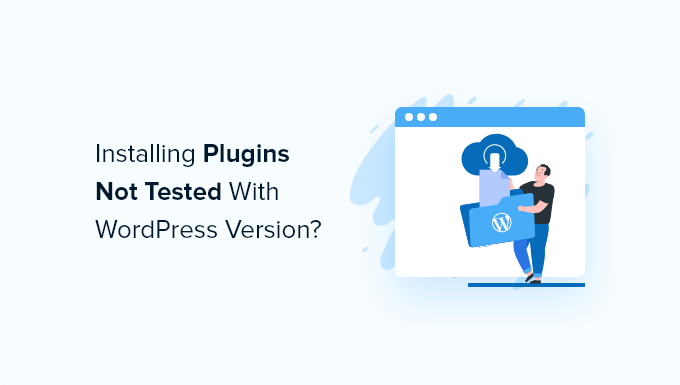
Wie erhält WordPress die Information „Plugin nicht getestet“?
Sie fragen sich, woher WordPress weiß, ob ein Plugin mit Ihrer WordPress-Version getestet wurde oder wer für das Testen verantwortlich ist?
Beim Einreichen von Plugins in das WordPress-Plugin-Verzeichnis müssen die Autoren eine „Readme“-Datei zusammen mit ihrem Plugin einfügen. Diese Datei wird von WordPress verwendet, um die Seite mit den Details über das Plugin zu erstellen.
Plugin-Autoren sind dafür verantwortlich, ihr Plugin mit der neuesten Version von WordPress zu testen und die Versionsnummer in ihrer Readme-Datei manuell zu aktualisieren.
Wenn Sie die Meldung „Dieses Plugin wurde nicht mit der neuesten Version von WordPress getestet“ sehen, bedeutet dies, dass der Plugin-Autor die Readme-Datei nicht mit der neuesten WordPress-Versionsnummer aktualisiert hat.
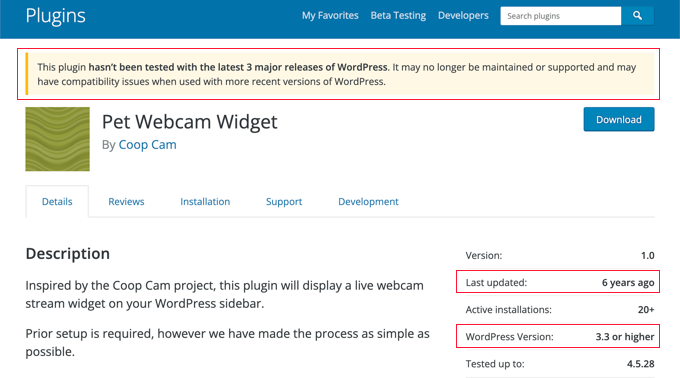
Dies bedeutet nicht unbedingt, dass das Plugin WordPress-Fehler verursacht.
Warum aktualisieren die Autoren von WordPress-Plugins nicht die Readme-Dateien?
Manchmal aktualisieren Plugin-Autoren ihre Readme-Dateien nicht, selbst wenn sie ihr Plugin so testen, dass es mit jeder neuen WordPress-Version funktioniert.
In einer idealen Welt werden diese Informationen immer dann aktualisiert, wenn ein Plugin auf seine Kompatibilität mit dem neuesten WordPress-Update getestet wird.
Allerdings sind viele Entwickler in der Regel mit bezahlten Entwicklungsprojekten beschäftigt. Da die im WordPress-Plugin-Repository aufgeführten Plugins kostenlos sind, gibt es für die Entwickler weniger Anreize, die Plugins und die Readme-Datei ständig auf dem neuesten Stand zu halten.
Sollten Sie WordPress-Plugins installieren, die noch nicht getestet wurden?
Die kurze Antwort lautet: Es kommt auf das Plugin an.
Nur weil ein Plugin-Autor seine Readme-Datei nicht aktualisiert hat, bedeutet das nicht, dass das Plugin nicht getestet wurde und nicht mit der neuesten Version von WordPress funktioniert.
Meistens hängt es von der Funktionalität des Plugins ab und davon, wie komplex es ist. Es gibt zum Beispiel einfache Plugins, die sich direkt in den WordPress-Kern einklinken und seit Jahren nicht mehr aktualisiert werden müssen, um ordnungsgemäß zu funktionieren.
Die Meldung „nicht getestet“ bedeutet nicht, dass das Plugin Probleme oder Sicherheitslücken aufweist. Sie besagt lediglich, dass der Entwickler das Plugin nicht kürzlich getestet oder die Readme-Datei nicht aktualisiert hat.
Hier bei WPBeginner empfehlen wir unter bestimmten Umständen die Installation von Plugins, die nicht mit der aktuellen Version von WordPress getestet wurden. Wir testen das Plugin gründlich, um sicherzustellen, dass es so funktioniert, wie es soll.
Wenn Sie eines unserer WordPress-Tutorials lesen, das vor kurzem veröffentlicht wurde, dann bedeutet dies, dass das Plugin mit der neuesten Version von WordPress kompatibel war, als wir es getestet haben.
Eine weitere Möglichkeit zu prüfen, ob Sie das Plugin installieren sollten, ist die Plugin-Entwicklungsseite. Hier sehen Sie, wie aktiv der Plugin-Entwickler ist.
Gehen Sie einfach auf die WordPress-Plugin-Seite und klicken Sie auf die Registerkarte „Entwicklung“.
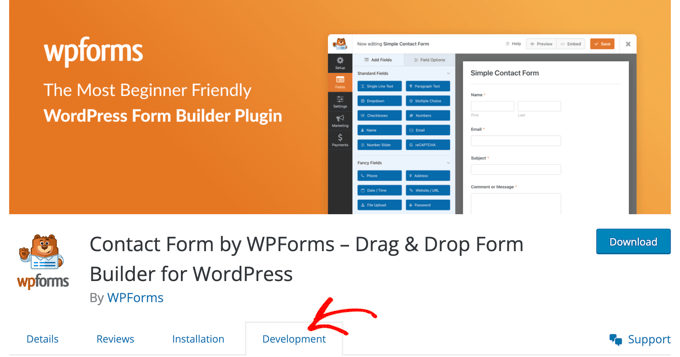
Hier können Sie sehen, wann das Plugin zuletzt aktualisiert wurde und welche Änderungen und Verbesserungen am Plugin vorgenommen wurden.
Wenn der Entwickler das Plugin aktiv aktualisiert, bedeutet dies in der Regel, dass das Plugin von hoher Qualität ist und sicher auf Ihrer WordPress-Website verwendet werden kann.
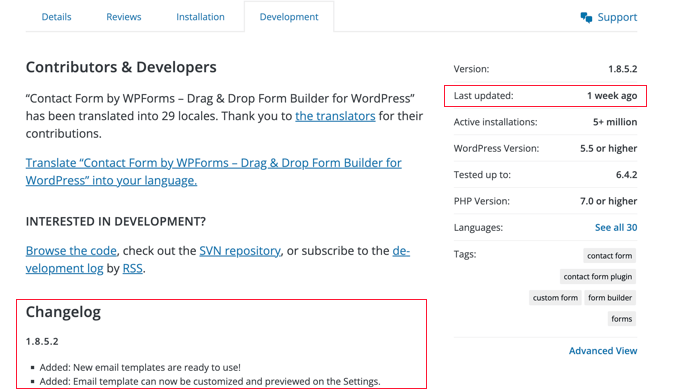
Wenn ein Plugin hingegen seit mehr als zwei Jahren nicht mehr aktualisiert wurde, bedeutet dies oft, dass es nicht mehr weiterentwickelt wird. In diesem Fall sollten Sie das Plugin nicht installieren, da der Entwickler es nicht mehr aktiv pflegt.
Sie können auch auf die Registerkarte „Bewertungen“ klicken, um andere Meinungen und eventuelle Beschwerden über Inkompatibilität zu lesen.
Wenn die Bewertungen aktuell sind und fünf Sterne haben, dann können Sie davon ausgehen, dass Sie das Plugin auf Ihrer Website verwenden können.
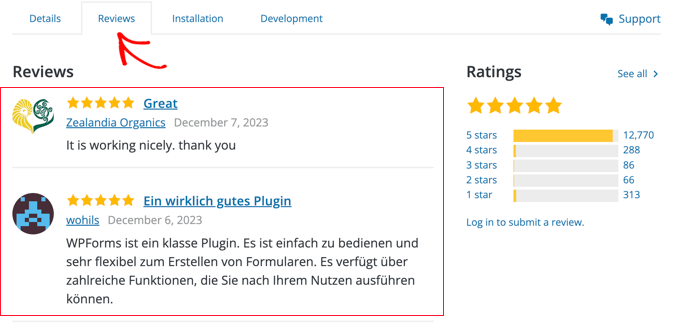
Schließlich können Sie das Plugin auf einer lokalen WordPress-Installation testen. So können Sie sehen, ob es irgendwelche Probleme oder Konflikte gibt, ohne dass Ihre Hauptseite beeinträchtigt wird.
Expertenleitfäden zur WordPress-Sicherheit
Da Sie nun wissen, wie man Plugins verwendet, die nicht mit Ihrer WordPress-Version getestet wurden, möchten Sie vielleicht einige andere Artikel lesen, die sich auf die Sicherheit Ihrer WordPress-Website beziehen:
- Ist es sicher, veraltete WordPress Plugins zu verwenden? (Erläutert)
- Soll ich WordPress Plugins die Berechtigung geben, Daten zu sammeln?
- Gründe, warum Sie nulled WordPress Themes & Plugins meiden sollten
- Sollten Sie den Entwicklern von Plugins für die Behebung von Fehlern Admin-Zugriff gewähren?
- Wie man ein WordPress Plugin richtig deinstalliert (Anleitung für Anfänger)
- Wie man WordPress ordnungsgemäß von HTTP auf HTTPS umstellt (Anleitung für Anfänger)
- So scannen Sie Ihre WordPress Website nach potenziell bösartigem Code
- Die besten WordPress Security Plugins zum Schutz Ihrer Website (im Vergleich)
- Wie man ein WordPress-Sicherheitsaudit durchführt (vollständige Checkliste)
- Der ultimative WordPress-Sicherheitsleitfaden (Schritt für Schritt)
Wir hoffen, dieser Artikel hat Ihnen geholfen zu erfahren, ob Sie Plugins installieren sollten, die nicht mit Ihrer WordPress-Version getestet wurden. Vielleicht interessiert Sie auch unser Leitfaden über den Unterschied zwischen einem Domainnamen und Webhosting oder unsere Expertenauswahl der besten E-Mail-Marketingdienste für kleine Unternehmen.
Wenn Ihnen dieser Artikel gefallen hat, dann abonnieren Sie bitte unseren YouTube-Kanal für WordPress-Videotutorials. Sie können uns auch auf Twitter und Facebook finden.




Syed Balkhi says
Hey WPBeginner readers,
Did you know you can win exciting prizes by commenting on WPBeginner?
Every month, our top blog commenters will win HUGE rewards, including premium WordPress plugin licenses and cash prizes.
You can get more details about the contest from here.
Start sharing your thoughts below to stand a chance to win!
Moinuddin Waheed says
Most of the time many of us don’t install a plugin only because it has not been tested for the recent updates of the WordPress.
Thank you for the clarification that it doesn’t matter if it has not been tested and why it doesn’t matter whether it has been tested or not.
The functionality of the plugin is what decides it’s usability and whether it should be installed or not as wordpress review team already would have passed the checklist.
WPBeginner Support says
Glad we could help understand what to expect with the message
Admin
Jiří Vaněk says
Thank you for the explanation. I always check this data before installing plugins and it never occurred to me that it works like this and the data just might not be up to date. So I’m assuming you’re then looking for information directly on the developer’s website?
WPBeginner Support says
Not always the developer’s site, you can also check the support forum for the plugin for if they are answering support questions.
Admin
Jiří Vaněk says
Thanks, I’ll know it next time. I’ve abandoned many plugins like this out of fear that even the author doesn’t care. This is big news for me.
Moinuddin Waheed says
Thanks for clearing the doubts related to plugin update and it’s installation.
I have always took a step back while deciding to install a plugin for certain functionality as I have always get a fear of security vulnerabilities if the plugin is not updated in recent especially with WordPress updates.
Is there a mechanism used by wordpress plugin repository before allowing any one to submit plugins available for download to ensure compatibility and security?
or anyone can just add plugin to wordpress plugin repository available for download?
WPBeginner Support says
There is a review process for any plugin submitted to the WordPress.org plugin repository that would review a plugin before it is added.
Admin
Jiří Vaněk says
So I’m assuming that some simple vulnerability testing of the code is also part of this process, or is that solely the responsibility of the plugin developer?
WPBeginner Support says
The review process checks the security, documentation, and presentation of the plugins added to the WordPress plugin repository. The plugin developer should be the one to manage the security of the plugin but the second check is there from the WordPress.org plugin review team to be safe.
Jiří Vaněk says
Wow, thank you wpbeginner team, for the clarification. I didn’t know this. It’s great to hear that not just anything gets into WordPress. Great
Andrew says
WordPress removed the compatibility section so now it’s impossible to vote. the warning means nothing at all, please confirm it and update.
WPBeginner Support says
Thank you for letting us know, we will certainly look into updating our article
Admin
sazi says
thank you
Prashant Ranjan says
First of all thanks for this great eye opening article and clearing all doubts related to installing untested plugins. I have always hesitated installing untested plugins despite its great reviews just because it has not been tested for a particular theme. For example, I abstained from installing Google official Adsense plugin with my existing theme for my travel website for the same reason. Placing ads manually on each post is tedious so I will try it now. But how Google has not updated it’s read me file for Adsense plugin, is out of my understanding.
Nouman Younas says
I was searching for this topic.
recently checked my plugins and half of them not updated from months and some not updated from 2-3+ years.
I don’t know what to do… i preferred to disable those plugins which are not compulsory.
WPBeginner Support says
As mentioned in the article above, sometimes plugin author don’t feel the need to update the plugin if there is nothing broken. If a plugin is working fine on your site and it hasn’t been updated for less than 2 years, then you can use it. If its older than 2 years, then you should stop using it and find an alternative plugin.
Admin
Nouman Younas says
thank you for answer
Yes. Finally i decided to remove those old plugins. some have not alternative like „currencyr“.
I guess, going for premium plugin is a good option or something else.
WPBeginner Support says
Glad you found it helpful. Did you checkout WP Currency Converter?
Kitty says
Thank you for this advice! So far in my minimal WP experience, I have steered clear of plugins that were not compatible with the most current version of my theme because I wouldn’t have a clue of how to fix something if the plugin adversely affected what I previously set up. Having the 2-year rule of thumb helped me decide to use a plugin that has not been updated in 1 year…so far so good (the plugin is the TinyMCE Spellcheck).
Doug says
Great detail and advice. I have been knocking this around in my head for so long I can’t tell you how much I appreciate the details!
Keith Davis says
Good advice and thanks for the additional info about plugins not updated for two years.
Makes perfect sense.
Peter Cralen says
Why somebody will install plugin if developer is even not able to update one number in readme file?
It is like purchase service from hosting company where their home page is down
WPBeginner Staff says
That’s the point you didn’t purchase it. It is available for free with no warranty and very limited support.
Peter Cralen says
I think price is not value, does not matter if its free or paid.
Better will be if people stay focused on quality instead of take something for free, bc. its free only.
Joel James says
I agree with you. Why can’t you test it your own, when it is free and you need it? Developers may not get time to update readme text on each WordPress updates. No point of complaining about it, since they are giving their work for free!!
Angélica Costa says
Because that plugin sometimes is the only one that works for you. And just because it hasn’t been updated, it does not mean in any way that is does not work.
And that is partially due to the awesome WordPress retrocompatibility.
Ryan Hellyer says
Some people refuse to update the readme because when doing that you also need to do a version number bump, which in turn triggers a release and causes users to need to update.
You can modify the readme without bumping your version number and hence triggering an update, but then you have multiple copies of the same plugin with the same version number which are not identical. Aside from feeling just wrong, that could theoretically trip up a security system which does a hash of the file system and checks with a known set of previously downloaded plugins.